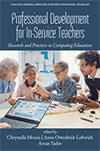
Professional Development for In-Service Teachers
Research and Practices in Computing Education
Edited by:
Chrystalla Mouza, University of Delaware
Anne Ottenbreit-Leftwich, Indiana University
Aman Yadav, Michigan State University
A volume in the series: Research, Innovation & Methods in Educational Technology. Editor(s): Chrystalla Mouza, University of Delaware. Nancy C. Lavigne, University of Delaware.
Published 2022
Computer science is increasingly becoming an essential 21st century skill. As school systems around the world recognize the importance of computer science, demand for teachers who have the knowledge and skills to deliver computer science instruction is rapidly growing. Yet a number of recent studies indicate that teachers report low confidence and limited understanding of computer science, frequently confusing basic computer literacy skills with computer science. This is true for both teachers at the K-8 level as well as secondary education teachers who frequently transition to computer science from other content areas, such as mathematics. As computer science is not yet included in most teacher preparation programs, professional development is a critical step in efforts to prepare in-service teachers to deliver high-quality computer science instruction. To date, however, research on best practices in computer science professional development has been severely lacking in the literature, making it difficult for researchers and practitioners alike to examine effective in-service preparation models.
This book provide examples of professional development approaches that help teachers integrate aspects of computing in existing curricula at the K-8 level or deliver stand-alone computer science courses at the secondary school level. Further, this book identifies computational competencies for teachers, promising pedagogical strategies that advance teacher learning, as well as alternative pathways for ongoing learning including microcredentials. The primary audience of the book is graduate students and faculty in educational technology, educational or cognitive psychology, learning theory, curriculum and instruction, computer science, instructional systems and learning sciences. Additionally, the book will serve as a valuable addition to education practitioners and curriculum developers as well as policy makers looking to increase the number of teachers who are prepared to deliver computing education.
CONTENTS
Introduction: Examining Professional Development Models for Computing Education, Chrystalla Mouza, Anne Ottenbreit-Leftwich, and Aman Yadav. Acknowledgments. PART I: PROFESSIONAL DEVELOPMENT APPROACHES FOR ELEMENTARY AND MIDDLE SCHOOL CONTENT AREA TEACHERS. Computational Thinking in Elementary Classrooms: A Toolkit to Scaffold Teacher Learning, Aman Yadav, Kathryn M. Rich, Christina V. Schwarz, and Rachel A. Larimore. Teacher Co-Design in a CSforALL Research–Practice Partnership: Curriculum Development and Teacher Learning, Florence R. Sullivan, W. Richards Adrion, Catherine Tulungen, and Emrah Pektas. Professional Development Supporting Middle School Teachers to Integrate Computational Thinking Into Their Science Classes, Quentin Biddy, Alexandra Gendreau Chakarov, Jennifer Jacobs, William Penuel, Mimi Recker, and Tamara Sumner. Teachers’ Knowledge and Skills in Computational Thinking and Their Enactment of a Computationally Rich Curriculum, Irene Lee, Ling Hsiao, and Emma Anderson. Looming Code: A Model, Learning Activity, and Professional Development Approach for Computer Science Educators, Heidee Vincent, Victor R. Lee, Aubrey Rogowski, and Mimi Recker. PART II: PROFESSIONAL DEVELOPMENT APPROACHES FOR HIGH SCHOOL TEACHERS. Re-Making Education in STEM Classrooms With Computational Play, Brian E. Gravel, Maria C. Olivares, and Eli Tucker-Raymond. Culturally Responsive Methods for Engaging All Students in Computer Science Principles, S. Megan Che, Rhoda Latimer, Eileen Kraemer, and Murali Sitaraman. E-Books for High School Computer Science Teachers, Barbara J. Ericson and Mark Guzdial. Implementing a Professional Development Framework to Assist the Rollout of Computer Science in Second-Level Schools in Ireland, Oliver McGarr, Merrilyn Goos, Clare McInerney, Keith Johnston, and Una Flemming. PART III: ONGOING AND SCALING- UP PROFESSIONAL DEVELOPMENT APPROACHES. Supporting Ongoing Teacher Capacity and Development: Moving Beyond Orientation Professional Development to Support Advanced Teacher Learning, Leigh Ann DeLyser, Stephanie Wortel-London, and Lauren Wright. Leveraging Collective Impact to Scale Computer Science Teacher Professional Development and Certification, Carol L. Fletcher and Jayce R. Warner. Expanding Computer Science Opportunities: A Personalizable, Flexible Model for Professional Learning, Dave Frye, Mark Samberg, and Ha Nguyen. Code Savvy Educators: A Professional Development Model for In-Service Educators, Lana Peterson, Cassandra Scharber, Sarah Barksdale, Andrea Wilson Vazquez, and Tom Cozzolino. PART IV: ALTERNATIVE PROFESSIONAL DEVELOPMENT APPROACHES: UNIVERSITY COURSES AND MICROCREDENTIALS. Supporting In-Service Teachers in Understanding the Potential of Data and Artificial Intelligence to Influence and Impact Learning, Justin Olmanson, Jennifer Davis, and Matthew Kilbride. Credentialing Computation: Empowering Teachers in Computational Thinking Through Educator Microcredentials, Quinn Burke, Colin Angevine, Chris Proctor, Josh Weisgrau, and Kerri Ann O’Donnell. From Clock-Based to Competency-Based: How Micro-Credentials Can Transform Professional Development, Melissa A. Rasberry, Gretchen Weber, and Joseph P. Wilson. About the Editors. About the Contributors.
-
Paperback978-1-64802-906-6
Web price: $62.04 (Reg. 72.99)
-
Hardcover978-1-64802-907-3
Web price: $89.24 (Reg. 104.99)
- eBook978-1-64802-908-0

- EDU046000 - EDUCATION: Professional Development
- EDU015000 - EDUCATION: Higher
- EDU037000 - EDUCATION: Research
-
 Constructivist Instructional Design (C-ID)
Foundations, Models, and Examples
Constructivist Instructional Design (C-ID)
Foundations, Models, and Examples
-
 Evaluating Electronic Portfolios in Teacher Education
Evaluating Electronic Portfolios in Teacher Education
-
 Evaluating Technology in Teacher Education
Lessons From the Preparing Tomorrow’s Teachers for Technology (PT3) Program
Evaluating Technology in Teacher Education
Lessons From the Preparing Tomorrow’s Teachers for Technology (PT3) Program
-
 Frameworks for Integrated Project-Based Instruction in STEM Disciplines
Frameworks for Integrated Project-Based Instruction in STEM Disciplines
-
 Preparing Pre-Service Teachers to Teach Computer Science
Models, Practices, and Policies
Preparing Pre-Service Teachers to Teach Computer Science
Models, Practices, and Policies
-
 Research on Technology in English Education
Research on Technology in English Education
-
 Research on Technology in Social Studies Education
Research on Technology in Social Studies Education

